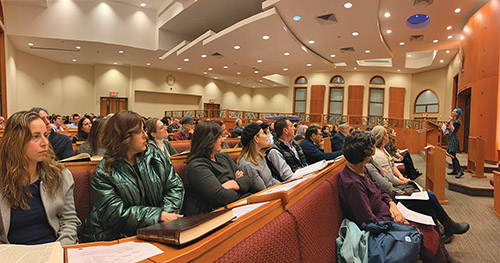

On Thursday evening, February 20, a large gathering of men and women assembled at Congregation Rinat Yisrael to participate in a Daf Yomi learning session offered by Rabbanit Michelle Cohen Farber. Women, as well as couples seated alongside each other, followed the shiur on the daf. The topic addressed was Gemara Brachot 38: Issues Related to Birkat HaMazon. In her standard 45-minute time slot that she uses on her podcast, Daf Yomi for Women, Farber re-created a typical Daf Yomi session, providing color-coded charts for easier comprehension. The audience was fully engaged and an air of excitement was tangible.
When Farber arrived in Israel as a student at age 20, she explained, she brought with her the facility in Torah SheBa’al Peh she had garnered from her education at Yeshivah of Flatbush. She continued her studies in the Talmud program at Bar Ilan University and Midreshet Lindenbaum’s scholar’s program.
Twenty-eight years ago, Farber had to carve out her own path in the world of Talmud studies offered to women. Today, through long-established strong programs at Nishmat, Matan, Midreshet Lindenbaum and a number of other programs in Israel and the U.S., as well as the proliferation of online resources, the road for women desiring the serious pursuit of Talmud studies is much more accessible. Farber has taught Gemara and Halacha in Pelech Jerusalem, Midreshet Lindenbaum and Matan HaSharon. With her husband, Rabbi Seth Farber, they founded and lead Kehillat Netivot in Ra’anana where they live with their five children. Rabbi Farber is the founder of ITIM, an Israeli social advocacy organization.
Rabbanit Farber was one of the creators of the Hadran Siyum HaShas for Women this past January, which was held in Jerusalem, to which 3,300 people attended and 10,000 others around the world participated. This was the first such global siyum specifically celebrating women completing the cycle. Hadran, also founded by Farber with several others, is self-described as a global forum that aims to make Talmud study accessible and relevant to Jewish women at all levels. Seeking to provide resources for women looking to advance their Talmmd learning, Hadran offers daily Daf Yomi classes, commentaries and resources from women scholars around the world.
Perhaps most well-known among Hadran’s ever-expanding offerings is the podcast created by Farber for the 13th Daf Yomi, which just completed its seven-and-a-half year cycle. Farber is working on her second podcast to accompany the current cycle that began two-and-a-half months ago. It is available in Hebrew and English. “There is always time to join a cycle. Never be discouraged by timetables. You can catch up or go at your own pace,” she urged.
Farber expanded on a silent type of shift or “earthquake” in women’s learning that has occurred slowly over the last Daf Yomi cycle. “The number of subscribers to my first podcast, at its height, when we were leading up to the siyum, was approximately 250. Today, we have over 3,500,” Farber said. The assembled group applauded at this announcement.
The presentation at Rinat was Farber’s first large formal talk since the January siyum in Jerusalem, and was much anticipated by the community. In bringing the evening to a close, Farber invited the Teaneck community to join in Hadran’s mission of creating women’s communities of learning worldwide. She urged the formation of local groups to share their experiences and insights in studying Talmud together and to celebrate milestone siyumim.
Farber quoted a new recruit from Manhattan who expressed her exuberance for her newly found world of Talmud. “I loved Tanach. Now I am obsessed with Talmud. It enhances my day, inspires me Jewishly and deepens my appreciation of learning Tanach.”
By Pearl Markovitz
�










